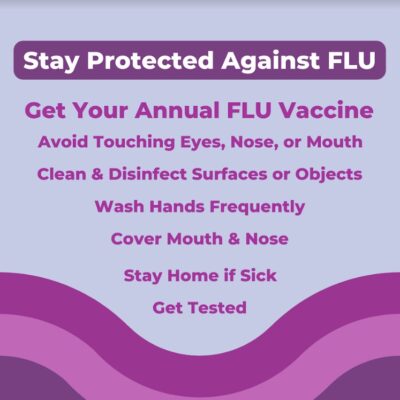Flu on the Rise: Understanding This Year’s Flu Season

Seasonal influenza (flu) activity is elevated across the country. The CDC is estimating that there have already been at least 20 million illnesses, 210,000 hospitalizations, and 13,000 deaths from the flu so far this season. And that includes 61 reported pediatric deaths.
As the flu continues to quickly gain traction this season earlier than usual, it’s impacting everyone of all ages and health statuses. Children and adults alike are missing school and work – not to mention other activities. Some hospitals are overwhelmed with patients due to FLU, COVID-19, and RSV cases. Even businesses have had to shut down temporarily as the flu sweeps through their staff.
What Can You Do to Stay Protected? Read On!
The single most important thing you can do to protect yourself, your family, and your community is to get your annual flu vaccine. Influenza is one of the deadliest vaccine-preventable diseases in America. While most people who get the flu will recover in a few days to less than two weeks, some people will develop complications as a result of the flu, which can be life-threatening and even result in death. When you get an annual flu vaccine, you reduce the chances of getting sick with the flu by up to 60%, and you reduce your risk of hospitalization and death. Getting vaccinated also helps protect others you may come into contact with. It’s not too late to get your flu vaccine this season! Doctor’s offices, urgent care clinics, and pharmacies are still readily available with flu shots to arm you with the best protection you need to fight the flu!
Did You Know?
No two flu seasons are alike. Flu viruses are constantly changing, so flu vaccines are updated from one season to the next to protect against the types of flu that are most likely to make people sick. Unlike other vaccines, flu vaccines are not intended to last longer than one year.
This 2022-2023 flu season, there are three flu vaccines that are preferentially recommended for people 65 years and older. These are Fluzone High-Dose Quadrivalent vaccine, Flublok Quadrivalent recombinant flu vaccine, or Fluad Quadrivalent adjuvanted flu vaccine. During most flu seasons, individuals who are 65 years of age or older tend to bear the greatest burden of severe flu disease.
Other Ways to Stay Protected
- Wash your hands frequently (and make sure your children are washing their hands, too). If you don’t have soap and water available, use hand sanitizer.
- Cover your mouth and nose (sneeze or cough into a tissue or cough into your elbow, not your hands!)
- Avoid touching your eyes, nose, or mouth. This is a simple way to slow the spread of germs.
- Clean and disinfect surfaces or objects. Frequently touched surfaces need frequent cleaning and disinfecting to prevent germs.
- Stay home if you are sick. If you have to go out, wear a mask.
- Get tested! Don’t ignore symptoms – ask to get tested for flu. Flu symptoms can look like many other illnesses, and testing is the only way to know for certain. Knowing which virus is making you sick allows your healthcare provider to give you the best treatment, such as antiviral medications.
While the rate of flu is quickly spreading, it doesn’t have to stop you from enjoying family gatherings and social activities. Remember to get vaccinated and encourage others to do the same. Families Fighting Flu has many resources and educational materials to help you learn more, and be sure to sign up for the newsletter for weekly flu updates to continue to understand this year’s flu season.

